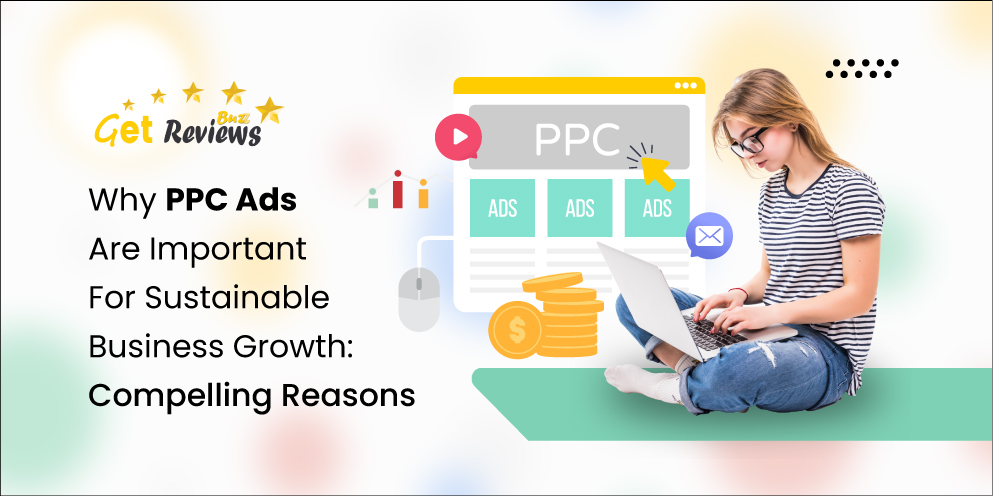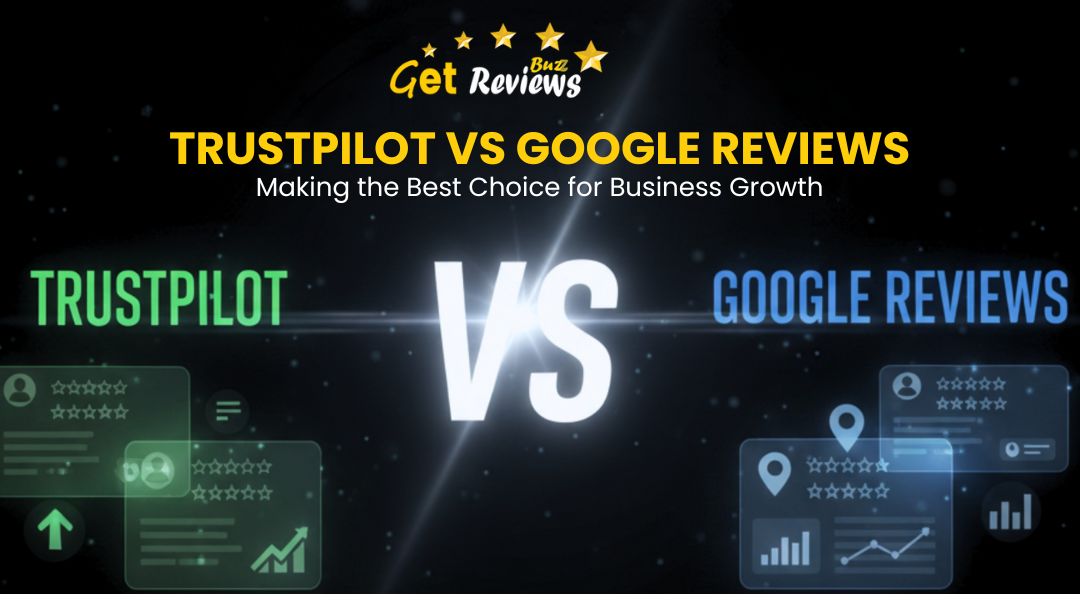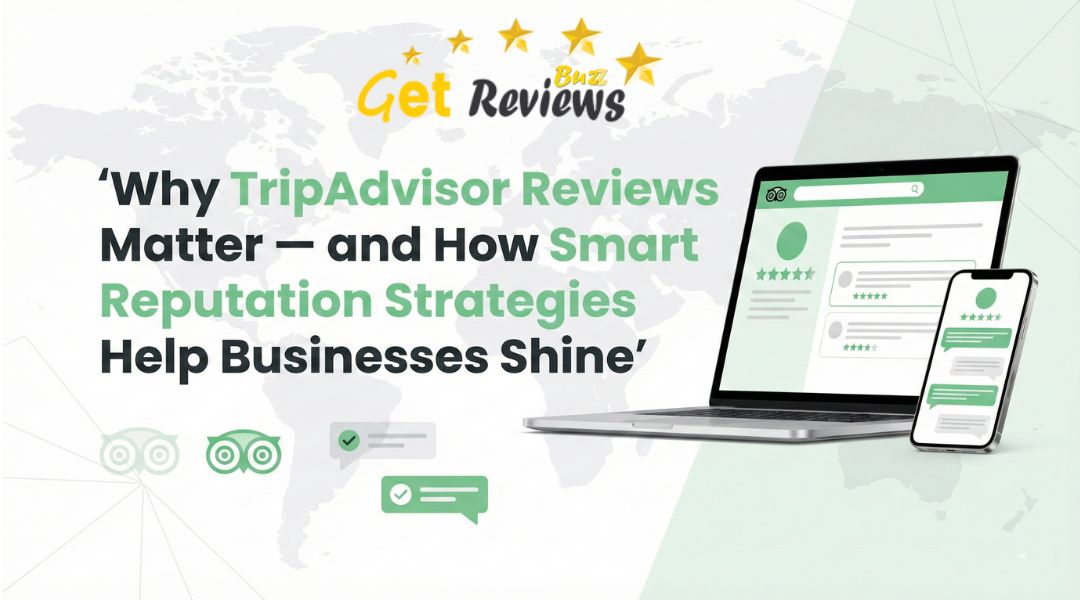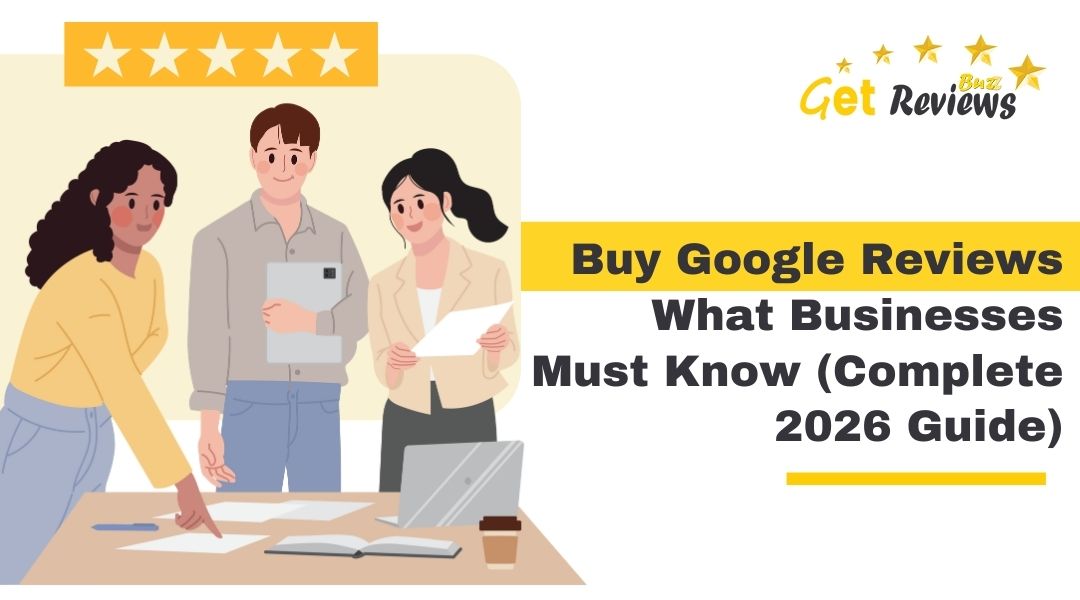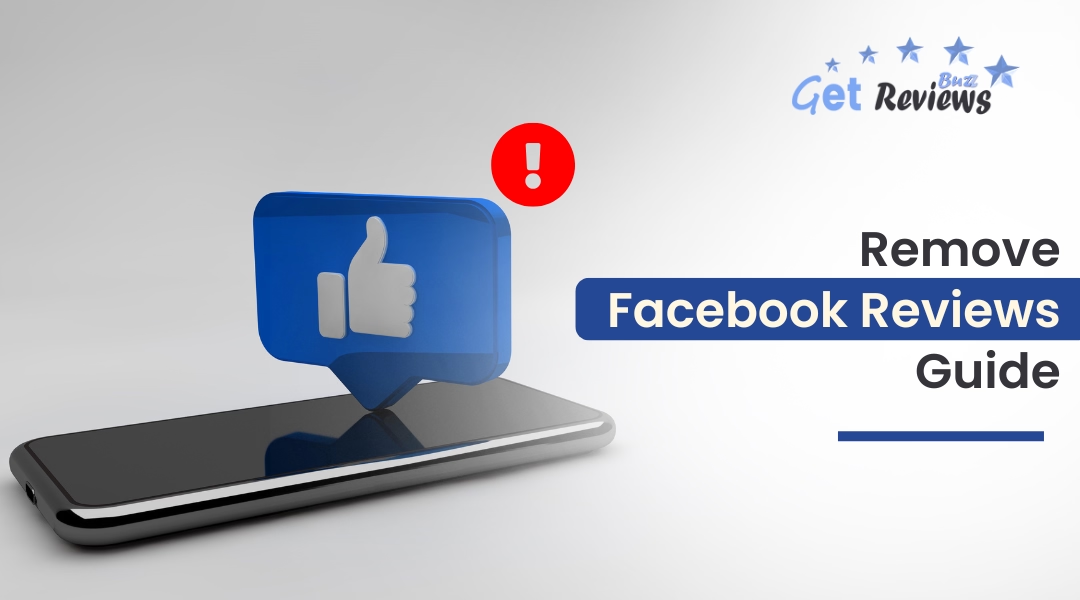The significance of Pay-Per-Click (PPC) advertising in the digital marketing landscape cannot be understated. Many businesses, particularly those newly adapting to online strategies, may often ask, “What is the importance of PPC?”
The answer is straightforward: PPC carries immense value.
Before embarking on a bespoke PPC strategy or committing resources towards establishing an ad campaign, being aware of PPC's critical role in enabling business growth in the online sphere is essential.
PPC enjoys widespread acknowledgment as one of the most efficacious modes of digital advertising due to its timely results and dependable returns. Undeniably ubiquitous, this technique enhances business visibility across search engines such as Google and Bing. Moreover, visitors who arrive via PPC methods demonstrate higher conversion rates.
Furthermore, businesses can optimize their involvement with complex aspects of PPC advertising through specialized services from experienced providers like Get Reviews Buzz. Offering comprehensive Pay Per Click Services that embody a robust blend of keyword optimization, ad management tactics, and performance tracking metrics, Get Reviews Buzz ensures your investment generates a maximal Return On Investment (ROI).
What is Pay Per Click Advertising?
Pay-per-click, or PPC, as it is generally known, is an effective approach to online marketing. You pay a fee each time a user clicks on one of your ads. It's sort of like buying visitors to your website instead of trying to acquire them organically.
Search engine platforms like Google Ads, which rely heavily on keywords, are among the most used types of PPC advertising. Here, the advertisers bid on relevant keywords, and when those terms show up in an internet user's search query, their advertisements appear at the top of the search engine results pages (SERPS).
However, this isn't only about search engines. Social media platforms such as Facebook and Instagram also provide Pay-Per-Click opportunities, with advertisements shown across a variety of websites, expanding its reach.
How Does PPC Advertising Work?
The mechanism of Pay-Per-Click advertising is remarkably engaging; it enables advertisers to place bids on particular keywords or phrases. When implemented correctly, these ads surface in search engine results whenever a user inputs the relevant keyword or phrase. Consequently, every time a user engages with these ads via clicks, the advertiser incurs a fee.
In developing an effective PPC campaign, advertisers tailor their digital marketing strategy to target certain demographics, interests, and geographic locales. They set maximum bids for desired keywords, keeping their budget constraints in mind.
Delivering top-ranked advertisements involves more than just bid amounts; search engines employ sophisticated algorithms that also evaluate factors such as:
- The relevance of the advertisement content to the targeted keyword
- The overall quality of the ad
Optimize this process further requires sharp PPC strategies and thorough campaign planning.
There's no lack of platforms where one can deploy PPC techniques - from top-tier ones like Google Ads down to various social media platforms such as Facebook and Instagram; they all present ideal landscapes for employing successful PPC campaigns. One can gain proficiency in utilizing these through dedicated resources available aimed at learning about successful PPC implementation tactics.
Advantages of Pay Per Click Advertising
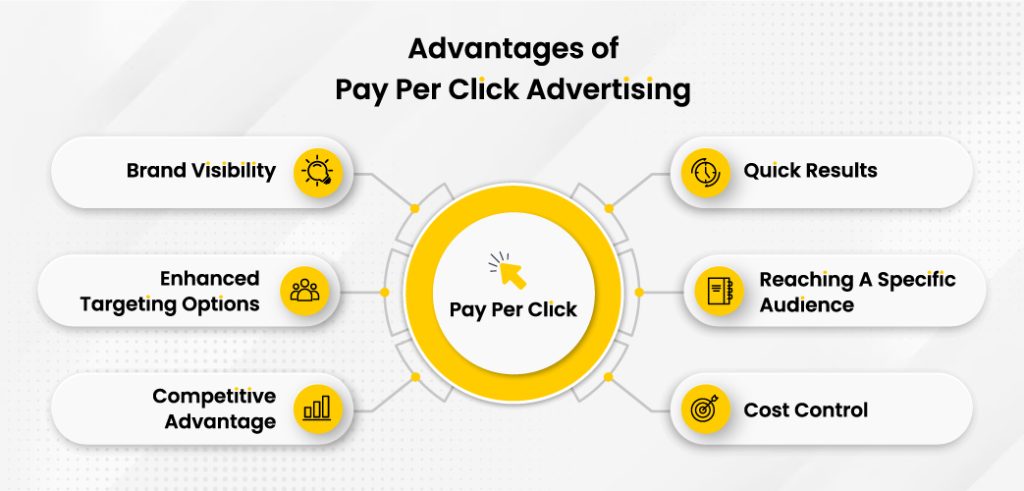
Outlined below are some prominent benefits of Pay Per Click Advertising. All of which enhance the growth and success potential of your business.
Quick Results
- PPC campaigns can be set up quickly in comparison to other types of advertising, such as SEO, which takes time to create an organic presence.
- Once the PPC ads are live, advertisers may see fast results, allowing for quick feedback and tweaks to improve performance.
Reaching a specific audience
- PPC advertising platforms such as Google Ads and Bing Ads provide advanced targeting options based on demographics, location, device type, and even specific keywords.
- Businesses may design highly tailored ad campaigns that target their ideal audience segments. This ensures that their PPC ads are seen by users who are most likely to be interested in their products or services.
Cost Control
- PPC advertising is based on a pay-per-click approach. This means advertisers only pay when users click on their ads.
- Advertisers have complete control over ad budget and bidding techniques. It enables them to establish maximum bids for same keywords and allocate funds according to their advertising objectives.
- Advertisers may alter their bids and budgets in real time based on campaign results, ensuring that they stay within budget while increasing ROI.
Measurable results
- PPC platforms offer precise performance metrics and analytics dashboards, allowing advertisers to monitor the impact of their ads.
- To measure the performance of their campaigns, advertisers can look at important metrics including click-through rate (CTR), conversion rate, cost per click (CPC), and return on ad spend (ROAS).
- This data-driven strategy allows advertisers to make informed decisions about campaign optimization and efficiently manage their advertising budget.
Brand Visibility
- PPC advertising is prominently shown at the top of search engine results pages (SERPs), above organic search results.
- This top placement improves a company's brand visibility and exposure to users who are actively looking for relevant items or services.
- Even if users do not click on the ad, the exposure can help increase brand awareness and recognition, confirming the company's presence in customers' minds.
Enhanced targeting options
- PPC platforms provide advanced targeting options like remarketing, which enables marketers to re-engage with users who have previously visited their websites.
- Custom audience targeting allows advertisers to target consumers based on their previous contacts with the company, like, email subscribers or repeat purchases.
- These targeting capabilities allow advertisers to offer highly relevant ads to specific audience segments, boosting the possibility of conversions and purchases.
Competitive Advantage
- In competitive industries, PPC advertising enables companies to efficiently compete for top ad locations and keywords.
- Advertisers can utilize strategic bidding and ad copy optimization to outperform competitors and gain a larger market share.
- Businesses may keep a competitive advantage and outperform their competitors by constantly monitoring and adjusting their marketing efforts.
What Are The Leading Pay Per Click Advertising Platforms?
The best Pay-per-click advertising systems give businesses tremendous options for reaching their target audience, driving traffic to their websites, and meeting their marketing goals. Here are some of the most popular PPC advertising platforms:
Google ads
- Google Ads is the largest and most popular pay-per-click advertising platform, allowing businesses to generate ads that display in Google search results, the Google Display Network, YouTube, and other partner websites.
- Google advertisements allow marketers to target consumers based on keywords, demographics, interests, and behaviors, and they only pay when people click on their advertisements.
- Google Ads provides several ad types, such as text ads, display ads, video ads, and shopping ads, offering advertisers a choice in how they reach their audience.
Bing ads
- Bing Ads is Microsoft's pay-per-click advertising platform that enables businesses to build ads that display in Bing search results as well as Yahoo and AOL search engines.
- While Bing Ads has a narrower reach than Google Ads, it can still be a useful tool for reaching individuals who use Bing as their primary search engine.
- Bing Ads provides similar targeting choices and ad styles as Google Ads, making it a viable alternative for organizations wishing to advertise their PPC efforts.
Facebook ads
- Facebook Ads is a prominent PPC advertising platform that enables businesses to generate ads for Facebook, Instagram, Messenger, and the Audience Network.
- Facebook Ads enables advertisers to target users according to demographics, interests, habits, and relationships, resulting in highly targeted and personalized ad campaigns.
- Facebook advertisements provide several ad formats, such as image advertisements, video ads, carousel ads, and lead generation ads, to meet various advertising objectives and audience preferences.
LinkedIn ads
- LinkedIn Ads is a pay-per-click advertising network created exclusively for professionals and businesses that target a B2B audience.
- LinkedIn Ads allows advertisers to target users based on their job title, industry, company size, seniority, and other professional attributes, making it a great platform for targeting decision-makers and influencers.
- LinkedIn Ads provides a variety of ad types, including sponsored content, sponsored InMail, and text ads, enabling marketers to interact with their target audience in a variety of ways.
Twitter ads
- Twitter ads is a pay-per-click advertising platform that enables businesses to generate ads that show in users' Twitter feeds and search results.
- Twitter Ads enables advertisers to target individuals based on demographics, interests, keywords, and follows, resulting in highly focused and relevant ad campaigns.
- Twitter Ads offers a variety of ad forms, such as promoted tweets, promoted accounts, and promoted trends, allowing advertisers to reach their target demographic across the Twitter platform.
What Is Essential For PPC Strategy And Campaign Planning?
The following are the steps that you should take when planning a pay-per-click (PPC) campaign:
- Define your audience: Determine the demographics of the individuals you wish to reach with your ads, such as their age, gender, location, and interests.
- Set specific targets: Define your goal for your PPC campaign, like, increasing website traffic, driving online purchases, or generating leads.
- Research keywords: Leverage keyword research tools to uncover the terms and phrases that your target audience is looking for. Incorporate them into your ad copy and website content.
- Create intriguing ad copy: Create catchy headlines and descriptions for your advertising to persuade visitors to click through to your website.
- Select the right ad platforms: Select which platforms you wish to promote on, like, Google Ads, Microsoft Advertising, Meta Ads, and so on.
- Monitoring and optimizing your campaign: Evaluate the success of your advertising. Make changes as necessary to optimize your campaign and reach your objectives.
- Evaluate several ad formats and targeting options: Experiment with numerous ad types (such as text, image, and video) and targeting settings to see which one performs most effectively for your campaign.
- Set a budget: Determine how much you'd like to spend on your campaign and stick to it.
Maximize Your PPC Potential WIth Get Reviews Buzz
Harness the power of PPC advertising and take your business to new heights with GetReviewsBuzz. Our cutting-edge pay-per-click services provide unparalleled visibility and rapid growth, ensuring that your business stands out in today's competitive landscape.
Experience the difference with our personalized PPC campaigns, which are tailored to your budget and goals. Our experienced staff creates appealing ad copy combined with data-driven insights, increasing your brand's visibility and conversion rates.
With our results-driven PPC campaigns, you can stay ahead of the competition and grow your reach. We are determined to go the extra mile for you. Contact us today to go on a journey to unprecedented success!
























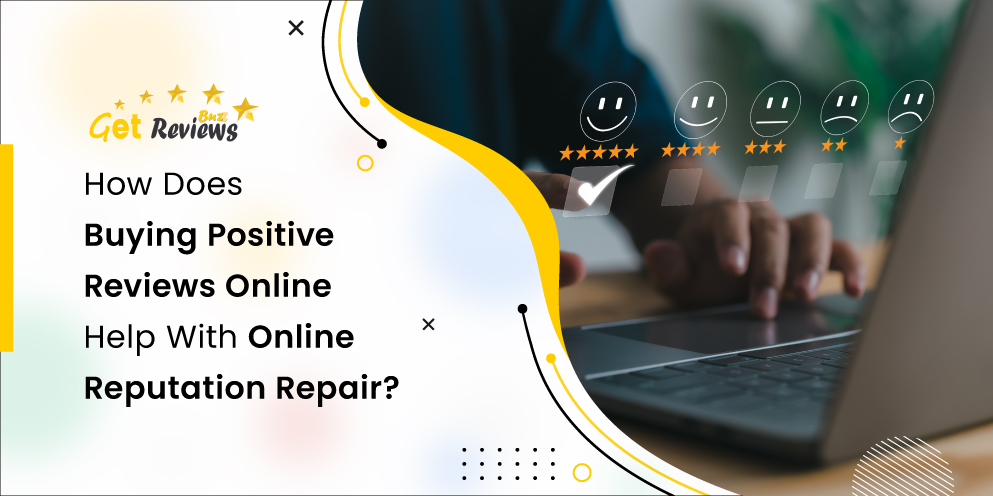

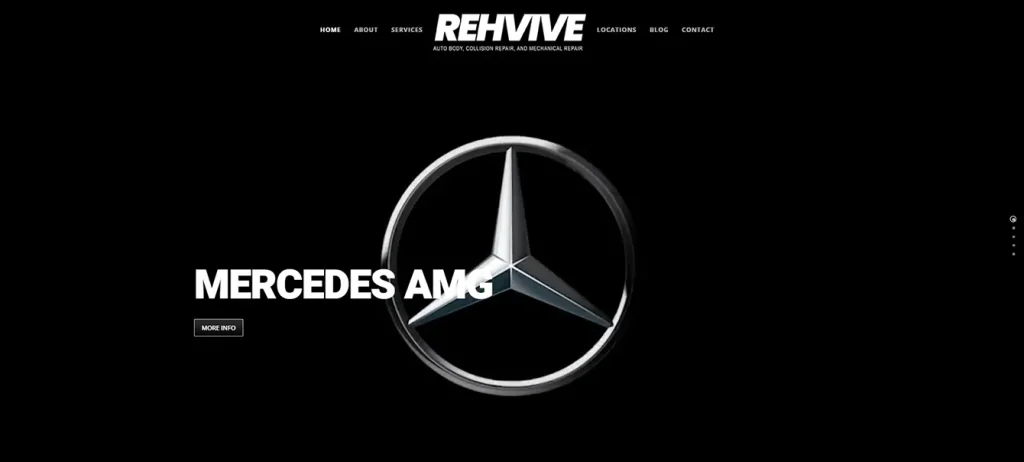
.jpg)
